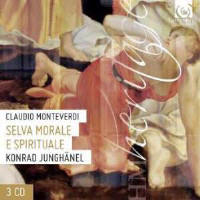Texte paru dans: / Appeared in: |
|
|
Outil de traduction (Très approximatif) |
|
|
|
|
|
Reviewer: J.
F. Weber Back in the 1960s, Michel Corboz recorded eight LPs titled "Selva morale e spirituale and other compositions for San Marco in Venice." The set included the published collections of 1641 and 1651, except for the two Masses, and over a dozen pieces published at various times earlier. I can't find a CD reissue of this set. I've noticed how seldom anyone ever tries to translate the title. Selva means forest, but the metaphorical meaning is "abundance," so this is a large collection of pieces. The "moral" pieces are devotional songs, while the "spiritual" pieces are liturgical works.
Since Corboz, most
interpreters have taken a different approach, recognizing that the various
psalms, hymns, canticles, and Marian antiphons fit together (as the varying
performing forces suggest) for Vespers of the major feasts of the liturgical
year. A major feast would be made up of the assigned texts set for several
singers with generous instrumental forces, while a lesser feast would use a
solo singer with continuo. Denis Stevens, Andrew Parrott, Frieder Bernius,
Gustav Leonhardt, Paul McCreesh, Roland Wilson, Franz Raml, and Howard Arman
have all made recordings of sets of Vespers using selections of these
pieces. Many of them were very effective in demonstrating the original
purpose of the works rather than their disposition in a collection that the
composer published late in life (the 1651 collection of leftovers was
posthumous, of course).
Now Konrad Junghänel has gone
back to the 1641 book and recorded everything on three well-filled discs.
The Mass, oddly enough, has been recorded far less often than the 1610
publication or the posthumous setting, although its presence in this book
indicates the composer's high regard for it, so its inclusion here is
especially welcome. It's helpful to recall the composer's position-in 1640.
The plague that devastated Venice in 1630 found him at the age of 63, a time
to contemplate retirement after 17 years at the helm of St. Mark's. He was
ordained a priest in 1632 and left composing for the basilica to such
associates as Rovetta and Rigatti. In 1638, he published as his Eighth Book
of Madrigals the secular works written mostly since his Seventh Book in
1619. Selva morale followed (the prints bear dates of 1640 and 1641), and he
died two years later. Hence this was a retrospective view of the works he
most wanted to disseminate to the wider world beyond his own choir.
Junghänel has made a stab at
arranging the pieces in some kind of order. The first and third discs
contain Vespers music, starting with Dixit Dominus and ending with the
Magnificat but a jumble of psalm, antiphons, and hymns in the middle. The
second disc contains the devotional songs, the contrafactum lament based on
Arianna's lament, the Mass, and the three Credo movements that Rovetta has
lately been discovered to have completed (the matching Gloria had to be put
on the third disc). The result is variety rather than the succession of
similar pieces that appear in print. The seven hymns actually have only four
different musical settings (which can be used with many other hymns of
corresponding meter), so only four different hymns are recorded. The Vespers compilations have been most helpful in situating Monteverdi's music in context, but some pieces have slipped through the cracks. Now once more we have the whole publication in a marvelous interpretation. Cantus Colin includes a dozen singers and eight players, bolstered by the six brass-players of Concerto Palatino. They capture the Venetian style with great panache. While I still like the Vespers services cited above, this complete collection is valuable for the overview of Monteverdi's choice sacred works. | |
|
Sélectionnez votre pays et votre devise en
accédant au site |
|
|
|
|
|
|
|
|
Cliquez l'un ou l'autre
bouton pour découvrir bien d'autres critiques de CD |
|



